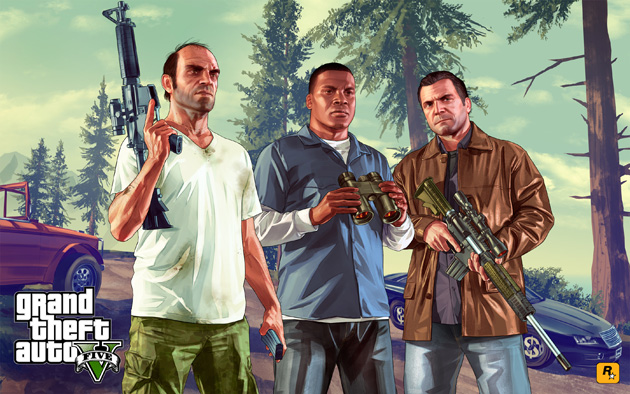Guns: Guns are a source of protection, a threat, and a leisurely hobby for use and collecting. Guns play a huge role in wars outside of the U.S. and inside it. Companies such as the entertainment industry has made the use of guns as a source of power, respect, and coolness among our communities. But the problem is that many believe that life is just like these video games and movies and certain people get a hold of these guns and then hurt or even kill the innocent with no outcome except punishment. Which calls for the need of restriction or full ban of guns.
The Influence: The entertainment Industry. For so long video games and films were trying to get more entertaining but in the process they also got more violent and graphic creating characters and scenes that some people believe they can imitate and be just like the actors.


Grand Theft Auto- A violent video game that lets Gamers do whatever they want that can be violent and menacingly.

G.I Joe- Stealthy War Ninja good with weapons
Image Provided by "The Guardian" (Website).
AUSTRALIA’S GUN LAWS MAY HAVE STOPPED MASS SHOOTINGS
Mass shootings stopped in Australia after strict new gun laws passed, researchers reported
And overall deaths from firearms have fallen since the 1997 law, which banned certain semi-automatic and pump-action weapons and forced owners to sell them back to the government, the team reported in the Journal of the American Medical Association.
“Following enactment of gun law reforms in Australia in 1996, there were no mass firearm killings through May 2016,” Simon Chapman of the University of Sydney and colleagues wrote.
They say they can’t prove the gun control measures caused the fall in gun-related deaths, but say they are worth discussing.
The mass shooting that prompted Australia’s crackdown happened in Tasmania, in 1996, when 28-year-old Martin Bryant shot and killed 35 people in a café. Another 23 were injured.
Just weeks before, a gun enthusiast shot and killed 16 screaming first-graders and their teacher in an elementary school in Dunblane, Scotland. Britain enacted a handgun ban soon afterwards.
Australia already had strict rules about handguns, but a revolted public backed wider reforms that banned rapid-fire long guns and forced the buyback of nearly 660,000 weapons.
Chapman’s team analyzed death statistics to see what effect the laws have had.
“From 1979-1996 (before gun law reforms), 13 fatal mass shootings occurred in Australia, whereas from 1997 through May 2016 (after gun law reforms), no fatal mass shootings occurred,” they wrote.
They were able to show that people didn’t find other ways to kill or to die by suicide — rates of homicide and suicide fell overall also. Because these rates tumbled, Chapman’s team said, they cannot show that the gun control measures were responsible.
One other Australian study showed that gun-related homicides decreased 7.5 percent per year following the reforms.
Daniel Webster, a researcher specializing in gun violence at Johns Hopkins University’s Bloomberg School of Public Health, says it’s doubtful the U.S. could do anything similar.
“Political, cultural, and legal challenges make it highly unlikely that the United States would implement comparable policies,” Webster wrote in a commentary in JAMA.
“Yet the experience in Australia over the past 2 decades since enactment of the NFA National Firearms Agreement provides a useful example of how a nation can come together to forge life-saving policies despite political and cultural divides.”
The study was done to mark the 20th anniversary of the Australian law, but it coincides with a push in Congress to enact some sort of gun control measures after a mass shooting at an Orlando nightclubin which a gunman killed 49 people.
Gun control is a bitter and divisive issue in the U.S. and just this week the Senate suppressed four measures that would have limited who can buy automatic weapons.
The U.S. has an exceptionally high share of gun violence. Research shows 31 percent of the world’s mass shootings occur in the U.S., where rough estimates suggest there are 300 million firearms.
Americans are seven times more likely to be murdered than people in 12 similar developed countries, and 20 times more likely to be killed by a gun.
Gun death rates in the U.S. were 11.2 per 100,000 people in 2015. That compares to a rate of 1.2 per 100,000 people in Australia.
A 2014 study found that guns hurt or kill about 10,000 American children each year.
“If U.S. firearm homicide rates were only 10 times as high as firearm homicide rates in Australia, rather than 23 times as high, there would be substantially fewer homicides,” Webster noted.
Last week, the American Medical Association voted to join the debate, promising to start lobbying Congress to enact some measures.
ELIMINATION OF FIREARMS
All guns should be banned from homes
Editor—Paula Baillie-Hamilton questions
whether reducing guns in the community
will reduce premature deaths.1 She urges
that advocates for a reduction in guns first
“look at the size of the problem” but then
goes on to consider only the rate of
homicide by guns. For every person
murdered with a gun in England and Wales
there are 4.75 who commit suicide with a
gun.2 The gun lobby argues that reducing
access to guns will simply result in method
substitution, but the largest multination
study concluded that the rate of household
ownership of a gun correlated with the rates
of homicide and suicide in which guns were
used, as well as the overall rates of homicide
and suicide.2 The study found no evidence
of a substitution effect in nations with low
rates of gun ownership.
Baillie-Hamilton also fails to consider
the relative size of the problem of deaths dueto guns in nations with fairly laissez faire gun
policies. A comparison of homicide rates
found that the rate of homicides not due to
guns was 3.7 times higher in the United
States than in Britain, while the rate of
homicides due to guns was 175 times
higher.3 Forty eight per cent of American
households have guns, compared with 4.7%
of British households.2
Writing from Australia, I find the most
curious aspect of the debate over gun
control in Britain since the shooting in Dunblane
to be why the legislation has
concerned only handguns. Thomas Hamilton
used a semiautomatic pistol in Dunblane;
Martin Bryant used a semiautomatic
rifle when he killed people in Tasmania.
Britain changed its handgun laws; Australia
outlawed semiautomatic rifles and pump
action shotguns. Can we presume from this
that if the killers’ choice of weapons had
been reversed, Tony Blair would have
effectively stopped pheasant and grouse
shooting? A sane policy, surely, would be to
ban all guns from homes and require their
use to be confined to target shooting ranges
under the strictest of licensing and storage
conditions. Gun shops are already entrusted
to store guns in maximum security. Such a
policy would surely gain their support.
Simon Chapman Associate professor
Department of Public Health and Community
Medicine, University of Sydney, Sydney 2006,
Australia
1 Baillie-Hamilton P. Elimination of firearms would do little
to reduce premature deaths. BMJ 1997;314:1693. (7 June.)
2 Killias M. Gun ownership, suicide and homicide: an international
perspective. In: Understanding crime. Experiences of
crime and crime control.Rome: United Nations Interregional
Crime and Justice Research Institute, 1993:289-302.
(Publication No 49.)
3 Clarke RVG, Mayhew P. The British gas suicide story and
its criminological implications. Br J Criminol 1991;31:
186-8.
Claim: Guns are not needed within our home land of the United States and should not be accessible to cops, gangs, or anyone in particular and should instead be banned for the use of everyone.
Reasoning: Guns only promote violence and by continuing to make the excuse that guns are used as a way of protection and can not be taken away will in time bring more pain and death to those who fall victim to gun violence and I believe all together we should push away instead of overlooked. There was a time when gun violence was not so strong and common that it would be best to leave our guns to the soldiers we call our protectors instead of using them to kill each other back home.
Victor Luna
"I believe guns should be restricted"
Shane Mclaren
"Guns like cars should be more seriously regulated in process by which they are acquired"
Joey D.
"I believe in access to guns however regulations as to acquiring guns should be instated"
Maria
"Shouldn't have guns, alternatives like pepper spray should be used first"
Reflection:
It is not a matter of who to blame for the deaths that come from shootings, nor who is right or wrong, it is just about realizing what is the safest approach for the good of our community. To commit to ones civic duty and own health of mind. Sometimes it takes stopping everything just for one moment or two and looking back to everything you have done to see what truly is right from wrong. Guns can save lives but at what cost?
References
“Australia's Gun Laws May Have Stopped Mass Shootings.” KMIR - Palm Springs News, Weather, Traffic, Breaking News, 15 Feb. 2018, kmir.com/2018/02/15/australias-gun-laws-may-have-stopped-mass-shootings/.
“Australia's Gun Laws May Have Stopped Mass Shootings.” KMIR - Palm Springs News, Weather, Traffic, Breaking News, 15 Feb. 2018, kmir.com/2018/02/15/australias-gun-laws-may-have-stopped-mass-shootings/.
Chapman, S. BMJ : British Medical Journal, U.S. National Library of Medicine, 18 Oct. 1997, www.ncbi.nlm.nih.gov/pmc/articles/PMC2127659/.
https://www.motherjones.com/politics/2013/06/video-games-violence-guns-explainer/
https://www.theguardian.com/science/head-quarters/2016/feb/12/violent-video-games-aggression-a-complex-relationship

No comments:
Post a Comment